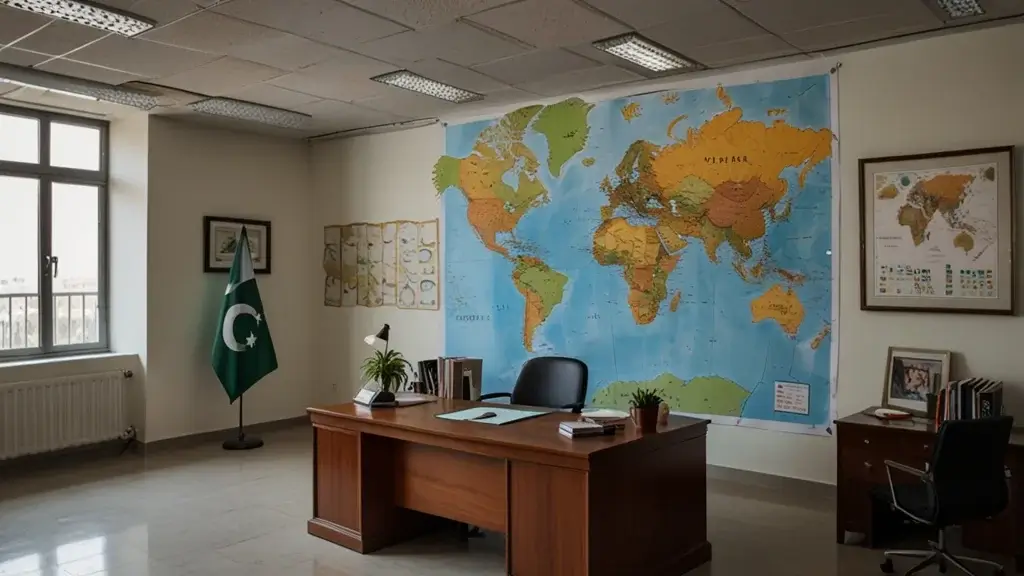Organization
An organization comprises a group of individuals together to achieve a shared goal or a series of objectives. An organization can range in size from two individuals to thousands.
Community-Based Organization (CBO)
A Community-Based Organization (CBO) is a local entity that delivers social services. It operates as a non-profit institution, relying predominantly on volunteer efforts. Consequently, CBOs are significantly dependent on voluntary donations for labor, materials, and financial resources. Davidson (1993) defined CBOs as formal or informal organizations representing a group of people with common local interests, living or working together within such limited geographical areas as neighborhoods.
Non-Government Organization (NGOs)
Davidson and Peltenburg (1993) described NGOs as private voluntary or non-profit organizations of professionals supporting other groups in need of assistance.
Legislation of NGOs in Pakistan
The NGOs are registered under several legislation in the nation.
- The Voluntary Social Welfare Agencies (Registration & Control) Ordinance, 1961
- The Societies Registration Act, 1860
- The Trust Act, 1882
- The Charitable Endowment Act, 1890
- The Companies Ordinance, 1984

Registration Authority
- Provincial Directorate of Social Welfare
- Joint stock Registrar
- Deputy Commissioner
- M/o Women Dev. S.W.& S.E
- Corporate Law Authority
NGOs and CBOs can work together to mobilize their collective voice when there is consensus about issues that call for communicating and influencing beyond their respective organizational boundaries. Community-based organizations (CBOs) provide a significant and pertinent function in delivering services at the local level. They operate in several domains, including education, healthcare, disability rights, and gender concerns.
Legal Framework for NGOs in Pakistan
- The Societies Registration Act, 1860; This Act pertains to nonprofit organizations with diverse public benefit objectives.
- The Trust Act, 1882; This legislation pertains to private trusts for various objectives.
- The Companies Ordinance, 1984 (section 42); This part of the Ordinance pertains to not-for-profit corporations established to further beneficial objectives.
- Voluntary Social Welfare Agencies Registration and Control Ordinance 1961; This Ordinance delineates acceptable objectives within the realm of social welfare. Organizations must register under this regulation to obtain government assistance.
The Societies Registration Act, 1860
Organizations or non-profit organizations recognized under The Societies Registration Act of 1860 are committed to advancing literature, science, the beautiful arts, and the dissemination of valuable knowledge. They also aim to spread political education and serve charitable purposes.
A collective of seven or more individuals engaged in literary, scientific, or philanthropic endeavors, dedicated to the promotion of knowledge, the establishment or support of libraries and reading rooms, public museums, art galleries, natural history collections, inventions, or designs, as well as the management, supervision, and oversight of local institutions such as schools, health centers, and welfare facilities, may convene to form a society. They must execute a memorandum of association and submit it to the Registrar of Societies.
The Trust Act, 1882
A public charity trust is created to benefit society at large or specific sectors thereof. This Act is applicable across Pakistan; however, it does not affect the provisions of Muslim law concerning waqf. A waqf in Islamic jurisprudence is generally created for a virtuous purpose, such as fostering piety, philanthropy, or religious endeavors. While trust property is vested in trustees, waqf property is considered to be vested in Almighty Allah.
A trust may be created for several legitimate objectives, such as the advancement of religion, education, public health and safety, and other advantageous endeavors. The objective of a trust is deemed legitimate unless it is expressly forbidden by law, contravenes legal prohibitions, involves fraud, inflicts injury on individuals or their property, or is adjudged immoral or contrary to public policy by the Court.
According to the Trust Act of 1882, a trust concerning immovable property must be established by a written non-testamentary document, signed by the trust’s creator or the trustee, and duly registered. Alternatively, it may be established by the intent of the trust’s creator or the trustee. A trust for moveable property is legitimate if declared in the aforementioned way or if ownership is transferred to the trustee. A Trust may be established by a settlement deed in accordance with the provisions of the Trusts Act 1882.
Companies Ordinance, 1984
Non-profit associations are constituted under section 42 of the Companies Ordinance, 1984. This regulation delineates two distinct categories of associations formed for non-profit objectives. A nonprofit association is an organization created to serve the public interest or promote mutual benefit rather than just seeking personal profit.
According to Section 42 of the Companies Ordinance, 1984, the principal objectives of the Association are to promote business, social services, religion, art, science, sports, charity, or other advantageous activities, and to allocate any earnings or revenue towards furthering these aims. Upon registration, the Association will possess the same rights and responsibilities as a Limited or Private Limited corporation, excluding the use of certain specified terminology.
The initial step to register as a non-profit Association is to get a license under Section 42 of the Ordinance from the Securities & Exchange Commission of Pakistan. Subsequently, the Association may move to register as a corporation. The organization is often a non-profit entity without shareholders.
The Co-operative Societies Act, 1925
- This Society is an organization where members voluntarily unite based on a common economic necessity, respecting one another as equals.
- A cooperative society is established when the members are the intended beneficiaries.
Non-profit Public Benefit Organizations (Governance and Support) Act 2003
A public benefit organization is a nonprofit entity that operates independently of governmental oversight. It is created for one or more public benefit objectives and may encompass local branches of international organizations. Nonetheless, it excludes foreign entities operating in Pakistan that possess a charter endorsed by the Government of Pakistan or have an existing protocol with the government.

Regulatory Framework
The Ministry of Social Welfare and Special Education, together with the Provincial Social Welfare Departments, supervises the registration and oversight of organizations in accordance with the Voluntary Social Welfare Agencies (Registration and Control) Ordinance 1961. The District Offices of the Industry Department oversee the registration of entities pursuant to the Societies Registration Act of 1860.
Nonprofit organizations are required to secure a license from the Securities and Exchange Commission (SEC). Specific criteria must be met for the SEC to provide a license approval. This encompasses stringent restrictions regarding financial transactions and corporate structure, emphasizing openness and responsibility.
The regulations forbid any remuneration to members and trading activities, mandating that organizations possess public corporation and limited liability status. Furthermore, there are stipulations to prohibit alterations to the memorandum and articles of association or the resignation of members without SEC authorization. Subsequently, people must file an application for a Certificate of Incorporation at one of the eight Company Registration Offices.
International NGOs are required to finalize the registration procedure and establish a Memorandum of Understanding (MOU) with the Economic Affairs Division. While not legally mandated, foreign NGOs often acknowledge that failing to register may result in complications with other governmental entities, thereby hindering their operations. Moreover, the Minister of Interior must meticulously scrutinize foreign personnel prior to providing registration permission and permitting their activities in designated areas.






